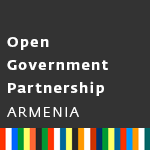3. Introducing the publicly available register of real owners
| Commitment Start and End Date: | 11.2018 - 12.2020 |
| Lead implementing agency: | Ministry of Justice |
| Person responsible from implementing agency: | Ani Varderesyan 3. |
| Title, Department: | Expert of the "Centre for Legislation Development and Legal Research" Foundation |
| Email: | ani.varderesyan@gmail.com |
| Phone: | +37410594023 |
Other actors involved
Other state actors involved
Prime Minister's Office, Ministry of Finance, Ministry of Territorial Administration and Infrastructure
Civil society, private sector
“Freedom of Information Center” NGO,
"Transparency International" Anti-Corruption Center,
“Armenian Lawyers' Association” NGO
Issue subject to regulation
Although the legislation in the Republic of Armenia (RA) prohibits public officials to be engaged in business activities, the absence of information on real owners of legal persons may practically result in violation of the mentioned requirement, which will, in its turn, contribute to spreading of corruption.
After the Velvet Revolution had taken place in the spring of 2018, the new Government of Armenia undertook a real and effective fight against corruption, which the publication of information on real owners of organizations will greatly contribute to. The Government of the Republic of Armenia will implement the international standards of transparency of owners and monitor abuses of companies.
Taking into account the explicit will of the new Government to eliminate corruption in all the spheres, the Government of the Republic of Armenia undertook to ensure transparency of the data concerning real owners.
Main objective
The main objective of the commitment being recommended is to ensure prevention of corruption and an effective fight against corruption due to disclosing and publishing the information on real owners of companies in all the sectors of activities through creating and operating a comprehensive register of the comprehensive registry within the scope of comprehensive state registration of legal persons, state record-registration of separated subdivisions of legal persons, institutions and persons placed on record-registration as individual entrepreneurs (hereinafter referred to as "the Register").
Publication of the information on real owners will also support customs and law-enforcement authorities in more effectively performing their functions. Transparency of this information will contribute to increasing and effectively implementing public supervision, forming public confidence in the Government. At the same time, this will also essentially contribute to a more active attraction of investments.
Brief description of commitment
The Government is committed to developing a common mechanism for identifying the real owners of companies operating in all the sectors, by creating and launching a comprehensive open and freely accessible register of real owners within the scope of the registry.
OGP challenge addressed by the commitment
Publicity, accountability, enhancement of public integrity, innovation.
Relevance to OGP values
The Register will provide access to actual owners’ information, increase public confidence, increase transparency and public control, and thereby improve the accountability of companies.
Ambition
The commitment is exclusive for both Armenia and other OGP member countries. Due to the implementation of the commitment, an effective tool will be created for the civil society and the State for later determining, according to sectors, who are the real owners of entrepreneurial activities in the given sector. This commitment is a comprehensive and inclusive program, which will result in great positive changes. It will have a major influence in the fight against corruption and money laundering. Implementing this commitment, Armenia will become one of the pioneers in the sector of revealing real owners (Beneficial Ownership) all over the world.
Potential Impact:
Implementation status
UN Goals
16.5 Essentially reduce corruption and bribery in all their forms. 17.17 Encourage and promote the existence of effective public, public-private and civil society partnerships, based on their experience and resource strategies.
